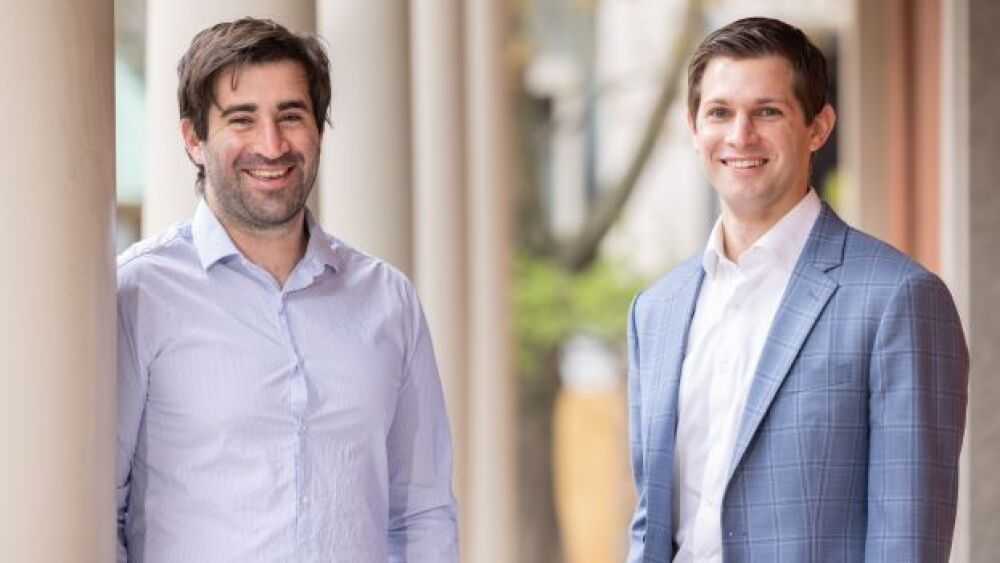Friday’s topline data from the Phase III PHOENIX trial of Relyvrio, which won approval in 2022, showed no significant difference on either the primary or secondary endpoints, according to Amylyx.
Pictured: From left, Amylyx Co-CEOs Josh Cohen and Justin Klee/Amylyx
A year and a half ago, the FDA approved Amylyx’s Relyvrio as just the third drug for amyotrophic lateral sclerosis after data from a Phase II trial showed the medication slowed the progression of the disease and extended the lives of patients by several months. Friday, Amylyx reported that a Phase III trial failed both its primary and secondary endpoints.
The Cambridge, Mass-based biotech announced that Relyvrio did not meet either the prespecified primary endpoint or secondary endpoints in the PHOENIX trial. There was no significant difference in the ALSFRS-R total score change from baseline at Week 48 compared to placebo, according to Amylyx.
Relyvrio also failed to elicit a significant difference compared to placebo in a subset of participants who met the previous CENTAUR trial criteria. Secondary measures included ALSAQ-40 change from baseline to Week 48 and slow vital capacity (SVC) change from baseline to Week 48.
PHOENIX enrolled 664 adult amyotrophic lateral sclerosis (ALS) patients, and participants were randomized three-to-two to receive either Relyvrio or placebo, with both treatment groups receiving standard of care. Patients were allowed to continue taking two other ALS drugs, riluzole and/or edaravone.
Safety data were consistent with the Phase II CENTAUR trial. There were no new safety signals, “reinforcing the favorable and manageable safety profile” observed to date, according to Amylyx.
“We are surprised and deeply disappointed by the PHOENIX results following the positive data from the CENTAUR trial,” Justin Klee and Josh Cohen, co-CEOs of Amylyx, said in a statement.
The company does not yet have survival data from PHOENIX and in an interview with BioSpace on Friday morning, Klee and Cohen would not speculate on a timeframe for those results.
“We’re deeply saddened, and I’d say it’s been a really, really tough day for the ALS community,” Klee told BioSpace.
In a previous interview with BioSpace, Klee and Cohen expressed optimism about the upcoming data readout. “Justin and I have full faith and confidence in our drug,” Cohen said. “[We] go in quite optimistic that we’ll see something very, very exciting for people living with ALS and the ALS community, but even if we end up showing smaller benefits, those are still huge.”
Klee was similarly upbeat in February. “ALS is largely looked at still as an untreatable disease, so showing twice with a treatment that you can fundamentally impact the progression of the disease, I think would be an enormous milestone,” he said.
A post-hoc analysis of the Phase II CENTAUR trial showed that Relyvrio elicited a 10.6-month longer median survival duration compared to placebo. The updated median survival of 18.8 months was an improvement over the 6.9 months initially reported. After the FDA’s Peripheral and Central Nervous System Drugs Advisory Committee committee initially voted 6-4 against recommending approval of what was then AMX0035 in March 2022, these data were enough to convince a rare second adcomm six months later.
Prior to Relyvrio’s approval in September 2022, the executives pledged that they would pull the drug from the market if the Phase III data were not positive.
“The commitment we made at the advisory committee meeting is we’ll do what’s right for patients,” Klee said. The company plans to meet with regulatory authorities, the ALS community and clinical experts, “and we’ll share plans, which may include voluntary withdrawal of the product.”
The executives noted in Friday’s announcement that lessons learned from the PHOENIX study will help inform future ALS research.
Heather McKenzie is a senior editor at BioSpace. You can reach her at heather.mckenzie@biospace.com. Also follow her on LinkedIn.






